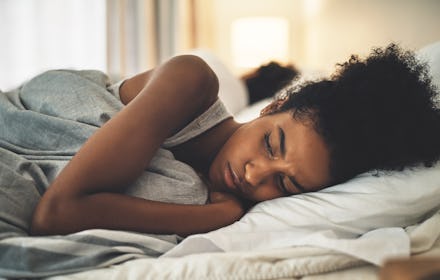How to stop seasonal depression from destroying your sex life

In many parts of the country, temperatures are falling, sweaters have replaced t-shirts, and cafés are selling pumpkin spiced everything. All signs point to cuffing season, when the single among us boo up and canoodle the winter away. But cuffing season isn’t sexy for everyone. If you have seasonal affective disorder (SAD), the cold, dark months can wreck your libido. Here’s how seasonal depression can mess with your sex life, and how to deal, according to an expert.
First of all, some background on SAD, a type of depression that typically occurs in the fall and winter, according to the International Society for Sexual Medicine (ISSM). Poor sunlight, which alters the production of hormones such as melatonin and serotonin, is thought to be responsible. Symptoms can include frequent feelings of sadness, difficulty concentrating, lethargy, and an inability to find pleasure in activities that usually make you happy.
SAD might diminish your interest in sex, or your energy for it, the ISSM notes. You might have trouble reaching orgasm. The role emotions play in your sex life matter, too. “For some folks, a quickie is a quickie,” says Veronica Chin Hing-Michaluk, a sex therapist and psychotherapist in New York City. “But folks who draw on their emotional intimacy or require emotional wellness and emotional resilience, where emotionality plays a factor in sexual identity or sexual expression, if your emotions take a hit and have been dysregulated, it’s a natural progression. Your sex life will take a hit.”
And if you’re a BIPOC, you might be facing heightened stress during or before an encounter with someone of another race, known as racial anxiety, especially now, she says. This could impair your ability to access pleasure by preventing you from connecting with others in a safe, fulfilling way.
Chin Hing-Michaluk suggests assessing whether activities that normally bring you joy, sexual or otherwise, now fail to do so. This indicates that a conversation with your partner about the systemic issues highlighted by the pandemic and sociopolitical climate, and how to support you in the coming months, might help.
Whatever your relationship status, Chin Hing-Michaluk encourages monitoring your sleep and eating habits, and basically cultivating your mind-body connection, “a great way to know in the moment how to assess what you’re feeling.” This way, you can strengthen your emotional resilience before winter hits. Emotional resilience is especially important in a socially isolating pandemic, and if you have a lived experience or mental health condition, like anxiety or depression, that affects how you connect with others, process information, and feel about yourself.
But Chin Hing-Michaluk recognizes that strengthening emotional resilience can be incredibly hard for some people. If you deem it necessary and have the means, connect with a therapist now so you can build a solid foundation with them before winter and the flood of clients the holiday season will likely bring. Say you wait to schedule your first session right before Thanksgiving. “I’m not going to know who you are, and I’m not able to provide the same type of support if I knew the constellation of factors affecting your life,” Chin Hing-Michaluk says.
If you have a marginalized identity or identities, you can find a therapist who shares your experience using the Inclusive Therapists directory. If you can’t afford therapy right now, free, community oriented, peer-led mental wellness interventions like Emotions Anonymous can allow you to connect with others in similar situations.
Whether you or your partner lives with SAD, journaling, gratitude lists, and mantras can create a sense of routine and stability in the short term, Chin Hing-Michaluk says. But, again, for long term, sustainable solutions, try to connect with a culturally adept sex therapist, if you can swing it. They can help you do the deep work of unpacking underlying causes and the influence of your intersecting identities on how you show up in life.
Most importantly, don’t beat yourself up if SAD seems to be messing with your desire, or your partner’s, especially during this particularly stressful period in history. Libido and sex drive are dynamic, affected by biological, psychological, and social factors, Chin Hing-Michaluk explains. “What you’re experiencing, it’s probably normal, and it’s probably shared by some other human.” Talking to someone who can affirm your feelings can help minimize the negative effects of not only SAD, but the collective traumas we’re experiencing.
“It’s important to be mindful of your identities and your partner’s identities and all of the social factors that are contributing to your feelings about sex at the moment, and those can change,” Chin Hing-Michaluk says. “Just because someone’s moving parts are differently attuned from yours doesn’t mean anything is wrong with either of you.”